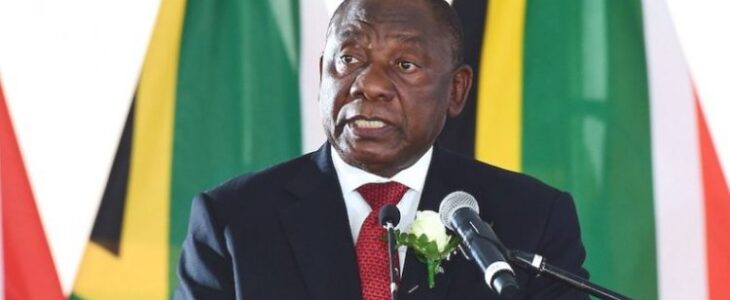
South Africa yesterday marked 30 years since the first democratic election in 1994 that ended apartheid white-minority rule, as President Cyril Ramaphosa hailed the country’s achievements under the leadership of the African National Congress (ANC).
“April 27 is the day we cast off our shackles. Freedom’s bells rang across our great country,” Ramaphosa, 71, said yesterday.

He added: “South Africa’s democracy is young. What we’ve achieved in these short 30 years is something of which all of us should be proud. This is an infinitely better place than it was 30 years ago,” he said in a speech marking “Freedom Day” at the Union Buildings, the seat of government, in Pretoria.https://googleads.g.doubleclick.net/pagead/ads?gdpr=0&us_privacy=1—&gpp_sid=-1&client=ca-pub-5228780540891921&output=html&h=300&adk=3372357004&adf=3002841736&w=360&lmt=1714280785&num_ads=1&rafmt=1&armr=3&sem=mc&pwprc=4671932670&ad_type=text_image&format=360×300&url=https%3A%2F%2Fleadership.ng%2Fsouth-africa-marks-30-years-of-democracy-after-apartheid%2F&fwr=1&pra=3&rh=275&rw=330&rpe=1&resp_fmts=3&sfro=1&wgl=1&fa=27&dt=1714280784391&bpp=19&bdt=2856&idt=-M&shv=r20240424&mjsv=m202404230101&ptt=9&saldr=aa&abxe=1&cookie=ID%3D2628f1fa0cf55ec2%3AT%3D1707753126%3ART%3D1714280702%3AS%3DALNI_MZDi3jn6K2VYeto-T9G3PAq6t3V-A&gpic=UID%3D00000d1dda1f9395%3AT%3D1707753126%3ART%3D1714280702%3AS%3DALNI_MY6JH_00KpuYecA6s3AJfsS36GhPQ&eo_id_str=ID%3Dad095625a25a3dcb%3AT%3D1707753126%3ART%3D1714280702%3AS%3DAA-AfjYNxIVixUw-DNJ7IMOUUMiP&prev_fmts=0x0%2C320x50&nras=2&correlator=6435092819289&frm=20&pv=1&ga_vid=1912441877.1707753130&ga_sid=1714280783&ga_hid=1922667573&ga_fc=1&u_tz=60&u_his=50&u_h=800&u_w=360&u_ah=800&u_aw=360&u_cd=24&u_sd=2&dmc=4&adx=0&ady=1162&biw=360&bih=688&scr_x=0&scr_y=0&eid=44759876%2C44759927%2C44759837%2C31082968%2C31083067%2C95329718%2C95330001%2C95329830%2C31082144%2C95331042%2C95331556&oid=2&pvsid=2875925077125375&tmod=1906521412&uas=0&nvt=1&ref=https%3A%2F%2Fleadership.ng%2F&fc=1408&brdim=0%2C0%2C0%2C0%2C360%2C0%2C360%2C688%2C360%2C688&vis=1&rsz=%7C%7Cs%7C&abl=NS&fu=128&bc=31&bz=1&psd=W251bGwsbnVsbCxudWxsLDNd&ifi=4&uci=a!4&btvi=1&fsb=1&dtd=656
After decades of white minority rule characterised by intense segregation based on race, the first inclusive election saw the ANC leader, Nelson Mandela, elected as the country’s first black president, four years after being released from prison.

After the ANC won overwhelmingly at the parliament, a new constitution was drawn up, and it became South Africa’s highest law, guaranteeing equality for everyone regardless of race, religion or sexuality.
Although the ANC has been in power since 1994 and is still regarded as the party that freed South African from the much hated apartheid, the party is facing some setbacks in recent times. It has lost its clout and is no longer celebrated in the same way because of growing poverty and economic inequality.
Ramaphosa used the occasion to list improvements brought about by the ANC but the party is struggling ahead of the May 29 polls and there are indications it could lose its outright parliamentary majority for the first time.https://googleads.g.doubleclick.net/pagead/ads?gdpr=0&us_privacy=1—&gpp_sid=-1&client=ca-pub-5228780540891921&output=html&h=300&adk=3372357004&adf=3167537780&w=360&lmt=1714280785&num_ads=1&rafmt=1&armr=3&sem=mc&pwprc=4671932670&ad_type=text_image&format=360×300&url=https%3A%2F%2Fleadership.ng%2Fsouth-africa-marks-30-years-of-democracy-after-apartheid%2F&fwr=1&pra=3&rh=275&rw=330&rpe=1&resp_fmts=3&sfro=1&wgl=1&fa=27&dt=1714280784391&bpp=17&bdt=2856&idt=18&shv=r20240424&mjsv=m202404230101&ptt=9&saldr=aa&abxe=1&cookie=ID%3D2628f1fa0cf55ec2%3AT%3D1707753126%3ART%3D1714280702%3AS%3DALNI_MZDi3jn6K2VYeto-T9G3PAq6t3V-A&gpic=UID%3D00000d1dda1f9395%3AT%3D1707753126%3ART%3D1714280702%3AS%3DALNI_MY6JH_00KpuYecA6s3AJfsS36GhPQ&eo_id_str=ID%3Dad095625a25a3dcb%3AT%3D1707753126%3ART%3D1714280702%3AS%3DAA-AfjYNxIVixUw-DNJ7IMOUUMiP&prev_fmts=0x0%2C320x50%2C360x300&nras=3&correlator=6435092819289&frm=20&pv=1&ga_vid=1912441877.1707753130&ga_sid=1714280783&ga_hid=1922667573&ga_fc=1&u_tz=60&u_his=50&u_h=800&u_w=360&u_ah=800&u_aw=360&u_cd=24&u_sd=2&dmc=4&adx=0&ady=2758&biw=360&bih=688&scr_x=0&scr_y=0&eid=44759876%2C44759927%2C44759837%2C31082968%2C31083067%2C95329718%2C95330001%2C95329830%2C31082144%2C95331042%2C95331556&oid=2&pvsid=2875925077125375&tmod=1906521412&uas=0&nvt=1&ref=https%3A%2F%2Fleadership.ng%2F&fc=1408&brdim=0%2C0%2C0%2C0%2C360%2C0%2C360%2C688%2C360%2C688&vis=1&rsz=%7C%7Cs%7C&abl=NS&fu=128&bc=31&bz=1&psd=W251bGwsbnVsbCxudWxsLDNd&ifi=5&uci=a!5&btvi=2&fsb=1&dtd=1113
“We have pursued land reform, distributing millions of hectares of land to those who had been forcibly dispossessed.
“We have built houses, clinics, hospitals, roads and constructed bridges, dams, and many other facilities. We have brought electricity, water and sanitation to millions of South African homes,” he added.
Credit: Leadership
